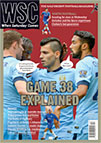 With declarations of superiority and personal messages from leaders, Jon Spurling looks at why the 1934 meeting of England and Italy was as much about politics as football
With declarations of superiority and personal messages from leaders, Jon Spurling looks at why the 1934 meeting of England and Italy was as much about politics as football
In November 1934, world champions Italy arrived at a packed Highbury to face an England team containing seven Arsenal players: Wilf Copping, Ray Bowden, George Male, Frank Moss, Ted Drake, Eddie Hapgood and Cliff Bastin. Benito Mussolini had claimed “Good kicking is good politics” and described Italy’s World Cup victory the previous summer as a “triumph for fascism”. Although tempting to suggest that Italy were little more than a collection of 11 sporting soldiers, the England players were also expected to demonstrate the superiority of the Britisher.
The FA continued to remain in isolation and opted against sending a team to the 1934 World Cup. Defender Male recalled a member of the selection committee informing him: “Spics and dagos need to be put in their place.” An FA statement claimed that England, Austria and Scotland were considered members of the “super class” of European sides, with the world champions failing to make the top three.
Both sides entered the fray with war-themed clarion calls ringing in their ears. The Italian team received a personal telegram from Il Duce, reminding them: “You must make use of all your energy and willpower in order to obtain supremacy in all earthly struggles.” England’s rallying cry came via the Daily Mirror, with the newspaper suggesting a “ten goal victory must be our aim. This is the real World Cup Final”. In the build-up, England players got wind of the fabulous bonuses that were on offer to the Italians – supposedly amateurs – if they won. A press leak revealed that the Azzuri stood to pocket £150 per man and a brand new Alfa Romeo car. This contrasted with England’s doughty professionals receiving a less than glamorous £2 appearance fee.
The game began in dramatic style. With barely a minute gone, Manchester City’s Eric Brook gave England the lead, and soon added another. When striker Ted Drake scored England’s third after 15 minutes, the Mirror’s prediction looked less outlandish. But trouble was raging on the pitch. Hapgood later claimed in his book Football Ambassador: “It’s a bit hard to play when somebody resembling an enthusiastic member of the Mafia is scraping his studs down your leg.” Hapgood’s nose had been broken by a single blow to the face from an Italian defender. Drake later pursued the gangster theme by describing the Italians as “occasionally villainous, shady and underhand”.
The truth was rather more complex, and in Arsenal’s Copping, nicknamed the “Iron Man”, England had their own enforcer. Just a minute after England’s opener, the Italian centre-half Luis Monti broke his foot in a clash with Drake. Legend has it that Copping later deliberately took hobbling Monti out of the game although there is no photo evidence to support this and the radio commentator, who happened to be Copping’s Arsenal manager, George Allison, made no mention of it. In Copping, a player who refused to shave on matchday and who was renowned for his volcanic temper, England had their own hired thug.
Even without Monti, Italy fought back magnificently and when Giuseppe Meazza made it 3-2 in the 60th minute, it seemed that the world champions might go on to win. But Copping liberally deployed his trademark – yet illegal – two-footed tackling in the second half to terrorise the Italian team. “By the end of the game,” Hapgood recalled, “Wilf was virtually playing Italy on his own.” The casualty list was extensive. Brook suffered a hairline fracture to his elbow, Hapgood had his nose reset and several others needed medical attention from England trainer Tom Whittaker. Three Italian players left the ground on crutches. The FA, shocked by the ferocious nature of the contest, threatened to ban all future internationals although, not for the last time, they later climbed down. “When you play teams like Italy, Male, you get situations like that,” insisted an FA official, conveniently overlooking the fact that Copping had been at the centre of much of the trouble.
More circumspect players looked beyond the furore of the combative side of the match, described by Stanley Matthews as “the filthiest game I ever played in”. Ray Bowden later noted: “Whereas we relied on direct long balls to our forwards, Italy were far more adept at passing their way into offensive positions.” Even the bullish Drake admitted: “Had Monti not been taken off, I’m sure that we would have faced an even tougher challenge, and the result could well have turned out differently.” Yet the press remained defiant, the Mirror insisting: “Here is irrefutable proof that the Italians are world champions by name only.” The Times added: “Can Italy really claim to be the best team in the world after this defeat?” The FA retained their isolationist stance, opting against sending England to the next World Cup.
In France four years later Italy retained their title by defeating Hungary in the final. A month before the tournament, the England team gave an infamous Nazi salute in a Berlin friendly against Germany. As the Battle of Highbury had already shown, international football was now as much about politics, propaganda and national image as sport.
From WSC 334 December 2014